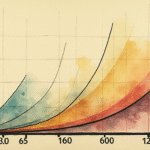Understanding the PTU and Its Distribution
The question of why profit-sharing (PTU) is not always equivalent to three months’ salary is a common one surrounding the distribution of profits. This rule, implemented four years ago with the outsourcing reform in 2021, has been part of the Federal Labor Law (LFT) but still causes uncertainty.
Three Months of Salary: A Cap, Not a Minimum
The quick answer is that three months’ salary serves as a cap, not a minimum. This criterion was integrated into the Federal Labor Law for calculating profit-sharing distribution with the outsourcing reform in 2021.
Different Rules for Confidence and Temporary Employees
There are also distinct rules for confidence employees and temporary workers, who also have the right to receive PTU.
Confidence Employees
For confidence employees, the amount they receive depends on whether their remuneration surpasses the highest salary of a unionized or permanent worker. If it does, this increased salary (by 20%) is considered the maximum salary for PTU calculation.
Temporary Employees
Temporary employees participate in the company’s earnings only if they have worked for at least sixty days during the year.
Key Questions and Answers
- Q: Why isn’t the PTU always three months of salary?
A: The three months’ salary is a cap, not a minimum. This rule was introduced in the Federal Labor Law with the 2021 outsourcing reform.
- Q: How does the PTU calculation differ for confidence employees?
A: For confidence employees, the PTU is calculated using their salary, which must exceed that of the highest-paid unionized or permanent worker. If so, their salary is increased by 20% to establish the maximum for PTU calculation.
- Q: What are the requirements for temporary employees to receive PTU?
A: Temporary employees are eligible for profit-sharing only if they have worked at least sixty days in a calendar year.
Context and Impact
The Profit-Sharing Unit (PTU) is a crucial aspect of labor relations in many countries, providing employees with a share of the company’s profits. In Mexico, this concept is governed by the Federal Labor Law (LFT), which underwent significant changes with the 2021 outsourcing reform. This reform aimed to regulate and balance the growing trend of hiring through subcontractors, ensuring fairer working conditions for employees.
One of the critical adjustments introduced was the PTU calculation rule, specifying that it should not necessarily equal three months’ salary but instead serve as a cap. This change impacted both unionized and non-unionized workers, including confidence employees and temporary staff. Understanding these distinctions is essential for employees to know their rights and the basis for PTU distribution.






